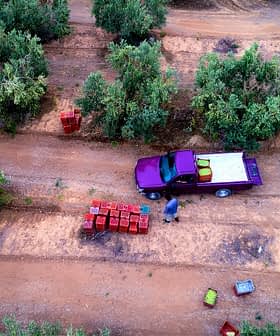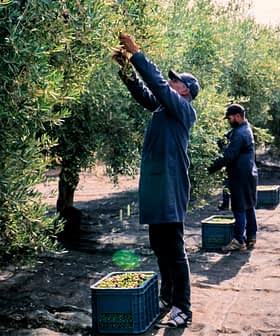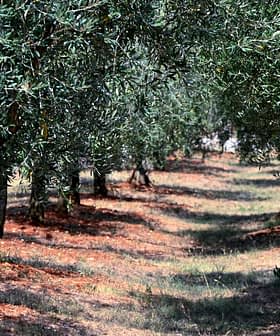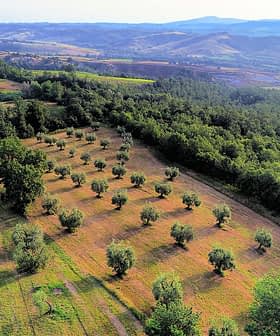 13.4K reads
13.4K readsProduction
A Dismal Harvest Concludes in Greece

Final estimates project that Greece’s olive oil yield will be between 150,000 and 170,000 tons, significantly lower than initially projected due to poor weather conditions. Production data show that the country’s olive oil crop is the lowest in the last six years, with some regions experiencing a decline of up to 70 percent in production compared to the previous year.
Final estimates for the weather-afflicted ‘off-year’ harvest in Greece suggest the country’s olive oil yield will fall below the initially projected 200,000 tons, reaching somewhere between 150,000 and 170,000 tons of olive oil.
Production data released by the European Commission also indicate a poor olive oil crop of 175,000 tons, the lowest in the last six years and a stark contrast from last year’s bumper harvest of around 340,000 tons.
“This has been one of the worst harvests in the last 30 years,” said producer and miller Periklis Tsoukalas from the Ilia region in the Peloponnese. “The initial estimates of 17,000 tons of olive oil in the region should be revised downward to around 14,000 tons.”
“Apart from the reduced quantity, only 70 percent of the freshly pressed olive oil classifies as extra virgin here due to problems with the olive fruit fly,” he added. “The pesticides used cannot fight the pest effectively.”
See Also:2023 Harvest UpdatesProducers in other regions were distressed by the extremely low yields, too.
“It’s not that we got less olive oil this year; we got none,” said Yiannis Souridis of the agricultural association of Potos-Theologos on the Aegean island of Thassos. “Our association produced 1,100 tons of olive oil last year. This year, however, we produced only 50 tons. You can see the difference.”
Quality consultant and olive oil taster Nikos Koutsoukos attributed the reasons behind the discrepancy between the initially estimated and the finally forecasted olive oil yield to the performance of the olive drupes and erratic weather during the harvest.
“At the time of milling, the olives did not fare as expected,” Koutsoukos told Olive Oil Times. “Simply put, a kilogram of olives yielded less olive oil than producers expected.”
“Another cause is the sudden weather phenomena, such as hailstorms, which hit the olive trees in some producing areas, knocking olives to the ground and further adding to the problem of reduced fruition this year,” he added.
Koutsoukos, a trained chemist with more than 25 years of experience in the Greek olive oil sector, outlined olive oil production in the country’s main producing regions, highlighting a sharp decline in most of them.
“Greece is expected to yield only around 150,000 tons of olive oil this crop year, almost half of last year’s quantity,” he said.
“On the Peloponnese peninsula, production in the northern regions will fare close to just 20 to 30 percent of last year’s yield,” Koutsoukos added. “Several olive oil mills in these areas did not open this season because of the significantly limited olive harvest.”
“The situation is better In the south and southwest of the peninsula, with the regions of Messenia, Ilia and Laconia likely to get 50 percent of last year’s quantity,” he continued.
In 2022/23, more than 100,000 tons of olive oil were produced in the Peloponnese, almost a third of the total national production.
Koutsoukos also confirmed the dramatic decrease in production in Crete, a hub of the Greek olive oil industry in good times.
“I recently visited the island and witnessed a steep drop of 60 to 70 percent in production in most areas,” he said. In Chania, however, production figures look slightly more optimistic, with the yield expected to amount to around 17,000 tons compared to 28,000 tons produced last year.
“We expect to get 60 percent of last year’s yield,” said Yiannis Mamidakis of the local department of agriculture. “In other regions [in Crete], the drop in production will be higher this season.”
According to other industry experts on the island, production will barely reach 30,000 tons compared to 130,000 tons produced in 2022/23.
Koutsoukos also said that in northern Greece, where olive trees thrive mainly in coastal regions due to the harsh winters, olive oil production is also very limited and will likely not exceed 30 percent of last year’s yield.
“We will have more precise figures for the whole country when we get the official estimates from the regional agricultural departments,” Koutsoukos added.
When it comes to quality, he noted that it remained high in most parts of the country despite concerns over the impact of pests and diseases.
“The quality of the season’s olive oil is high, although we were worried at the beginning of the harvest about problems caused by the olive fruit fly and the gloeosporium,” he said.
“However, the evolution of the weather conditions during the harvest season helped to mitigate any serious impact of pathogens on the olive oil Greece produced this year,” Koutsoukos added. “We only had some manifestations of the fly in Crete and sporadically in mainland Greece, which only caused minor problems.”
Koutsoukos said that, despite the shortage of land workers, producers across the country rushed to harvest their olives due to the high price extra virgin olive oil can fetch.
“In the long term, however, such high prices can harm the product itself,” he said. “High-quality extra virgin olive oil, for example, could become a luxury food product only for those with deep pockets.”
“In my opinion, the whole world is heading towards a time when top-graded foods, such as extra virgin olive oil, will become very pricey,” he added.
Koutsoukos finally pointed out that the record prices at origin in Greece, having climbed to even €10.00 per kilogram of extra virgin in Laconia, combined with the season’s meager harvest, have created a complicated conundrum for the country’s olive oil sector.
“The sector in Greece is at a crossroads,” he said. “The domestic market for olive oil is practically stagnant at the moment, with producers holding on to their limited stocks in anticipation of prices rising further, and it is almost impossible to predict which way things will go.”









